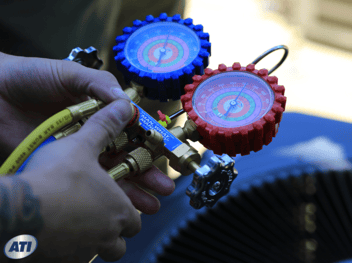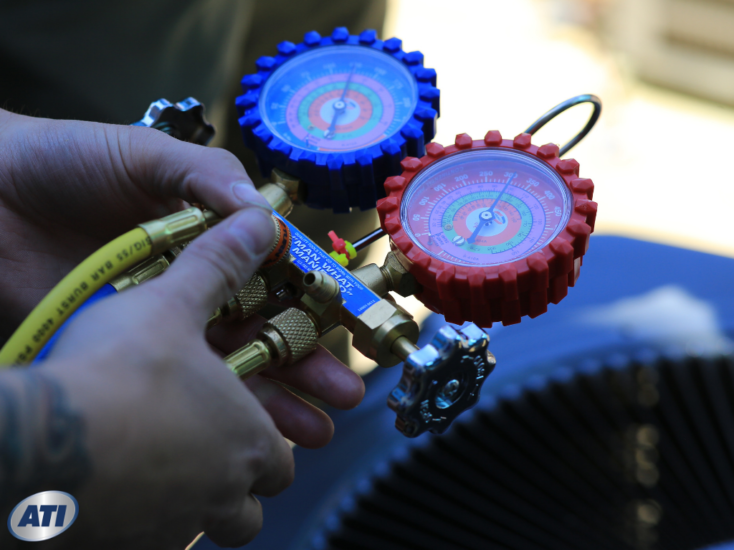HVAC Training Classes in Hampton Roads: Where Can I Go to School?

Are you looking for a career that will always have high demand? Almost every building has heating, ventilation and air conditioning (HVAC) climate control system and this creates several career opportunities. As the baby boomers retire and the Gen Xers are unable to fill all spots, there are very few workers left to fill the available job openings.
Three Reasons Why HVAC is a Great Career Choice
Promising Job Opportunities
The job growth in the HVAC field is estimated to grow by 15 percent (according to The U.S. Bureau of Labor Statistics). HVAC systems are becoming more and more complex, and this creates numerous job openings for those who have the technical knowledge on how to fix, install, troubleshoot and maintain these modern units.
You Can’t Outsource HVAC
Unlike other jobs, it’s not possible to outsource HVAC tasks as they must be done on site. This means that HVAC contractors have to work on the specific location where services for repair, installation, or maintenance of residential or commercial HVAC units are needed. The complex technicalities of modern HVAC units have made it almost impossible for individuals without any professional qualifications or experience to fix, maintain and even install their units by themselves.
Opportunity to Advance
There are plenty of opportunities for advancement in this field for technicians who work hard, take HVAC classes, and show commitment to this industry. It’s not an uncommon thing for HVAC technicians to work their way up into better paying managerial positions without the need for going back to school for further studies.
3 Reasons Why Formal Education is Important to Join the HVAC industry
Formal HVAC education will have several positive implications on your future. The people you meet while in school and the skills you acquire will put your career on the fast track to success. Some of the benefits of going to school include:
Certification
There are several other people applying for the same position, and you need to find a way to stand out. Saying you’re competent in a specific skill is one thing, and it’s another to prove you are qualified through certification. Employers know the significance of these certifications, and they know the skills they imply.
Networking Opportunities
You have most likely heard the phrase “it’s not about what you know, but who you know.” While having a rock-solid academic foundation is essential, networking will connect you to individuals that can help you land your dream job. Keep in mind that your classmates will one day be future industry leaders, and the connections you make in school can be important business contacts that you will use in your entire career.
Academic institutions also bring in reputable business leaders as guest lecturers who provide valuable insight into the industry. You can take advantage of this opportunity and make meaningful contacts in this business. When looking for a job after completing your education having an “in” with business leaders in this field helps.
Hands-on Experience
Formal training institutions offer hands-on experience that gives you a feel for your future career while still receiving your education. This helps you get real-life experience as you explore both theory and practical worlds of your training. Therefore, after graduating from school, you will have the necessary certification, education, and on-the-job experience that will make you a more suitable candidate.
What Education do you need to Start Working in the HVAC Field?
As a potential HVAC technician, you will need to first acquire professional training from a community college by enrolling in a HVAC technology associate’s degree program. Apart from learning about heating, ventilation and air conditioning units, your training will also include mechanical systems, temperature control, equipment design, blueprint reading, and electronics.
Most employers also look for candidates that are EPA (Environmental Protection Agency) certified. This certification proves that you can handle different types of refrigerants. There are three levels of EPA certification, and each requires applicants to pass an examination.
Ready to Move Forward?
Whether you want to speak to a career professional or you want to learn more about an Associate in Occupational Science Degree of HVAC Technology with Service Management, connect with Advanced Technology Institute today and get started on working toward your future.

Industry Knowledge
Welcome to the Advanced Technology Institute's Blog, your resource for industry insights and discussions on technologies shaping the future of automotive, heavy vehicle, hvac, welding, and other related career paths.
Explore how ATI's curriculum and hands-on learning opportunities can propel your career in the tech-driven world.





